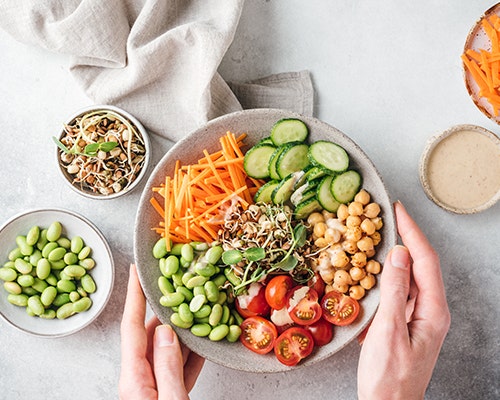The Benefits of Probiotics on Women's Health
- 9/12/22


From digestive health, and vaginal health, to immune system support, women are not like men. And this is why it’s important you understand the women's health benefits of probiotics. †
Use this blog as your go-to resource for all aspects of probiotics. Keep reading to learn about: †
-
What probiotics are and how they work
-
The microbiome and its role in whole-body health
-
The relationship between probiotics and prebiotics
-
The benefits of probiotics
-
How to choose a probiotic type that is right for you
-
How to take probiotics
Please remember if you are taking any medications, are pregnant, breastfeeding, or have any underlying health conditions, please contact your healthcare practitioner before taking supplements, vitamins, or minerals.
What are Probiotics?
Probiotics are beneficial bacteria that populate a healthy digestive system – also known as the human microbiome. These good bacteria play a pivotal role in supporting immune function, aiding in digestion and your ability to absorb nutrients from food, helping to maintain healthy blood sugar, supporting your vaginal health, and so many other body activities. [1] †
Probiotics facts you need to know: 1, [2], [3], [4] †
-
Probiotics are living microorganisms or microbiota with different health benefits and roles.
-
Probiotics live in your gut, mouth, vagina, urinary tract, skin, and lungs.
-
The most common bacteria in probiotics are Lactobacillus and Bifidobacterium.
-
Yeasts such as Saccharomyces boulardii are also found in probiotics.
-
Probiotics are found in fermented foods like yogurt with live active cultures, kefir, tempeh, kombucha tea, kimchi, miso, pickled vegetables, and sauerkraut.
- Consuming probiotic supplements and foods may help support a healthy microbiome.
How Probiotics Work
Probiotics work to keep your body in a healthy balance. They are actively working to ensure you can feel at your best. [4]
For example, when the bacteria in your microbiome is out of balance, your health could be compromised. Probiotics or good bacteria may help restore the balance in your microbiome so you can get back on track. [4]
Science shows that the benefits of probiotics include supporting your digestive, immune, and vaginal health and overall health and wellness. [1], [4] †
The Microbiome and Your Health
Researchers are learning so much about the role of the microbiome in supporting your day-to-day health and wellness. 3, [5], 9 †
-
The microbiome is composed of trillions of organisms, viruses, fungi, and bacteria living in your body.
-
Your microbiome is unique to you.
-
The makeup of your unique microbiome is connected to your overall health and wellness, including your immune system health, vaginal health, and heart health.
-
Most of your microbiome is composed of bacteria, with most of these living in your digestive system or gut.
-
Women also have a vaginal microbiome which is active in creating antimicrobial elements.
To learn more about the microbiome, read the Garden of Life collection of articles about the microbiome.
Probiotics vs. Prebiotics
Probiotics and prebiotics are not the same thing. [1]
Prebiotics are made of non-digestible carbohydrates that help encourage the growth of beneficial microorganisms like probiotics. 1, [6]
-
Prebiotic carbohydrates and dietary fiber are consumed by the healthful bacteria in your gut. [7]
-
Prebiotics are available in probiotic supplements, specifically formulated prebiotic supplements, and in food including honey, bananas, grains, vegetables (garlic, peas, asparagus, and more), milk, and soybeans. [7]
-
Prebiotics have an active role in supporting a healthful digestive system. [6]
The bottom line is – probiotics need prebiotics to help support your diverse needs. †
4 Benefits of Probiotics for Women
As you learn about probiotics, keep in mind these benefits of probiotics - it's not just about digestion: †
-
Your digestive health: women are more likely than men to experience digestive and gastrointestinal imbalances. A probiotic specifically designed for women’s digestive health and wellness that includes prebiotic fibers may help you take control of your digestive routine. [8] †
-
Your vaginal health: maintaining the health and balance of your vaginal microbiome is important for women of all ages. When your vaginal microbiome is unbalanced, you may be susceptible to bacterial vaginosis and urinary tract infections. If you’re prone to vaginal health concerns, a probiotic may help promote healthy yeast balance and support your vaginal and urinary tract health. [9], [10] †
-
Your immune system health: your gut microbiome has an important role in supporting a healthy immune system response. There is ongoing research into the benefits of probiotics to understand how they may play an active role in a healthy immune response. 1, [11] †
-
Your overall health and wellness: remember the trillions of bacteria in your microbiome are instrumental in more than balanced digestive health. Your microbiome needs a consistent source of the good bacteria found in probiotics, to support your overall health and wellness. 1, 2, [12], [13] †
How to Choose a Probiotic Type that is Right for You
Every person is unique, with their own health needs and individual gut and vaginal microbiomes. †
However, there are specific probiotic bacteria that have demonstrated positive health outcomes for women: †
-
Lactobaccilus rhamnosus is one of the most clinically studied probiotics and has demonstrated to be extremely beneficial for women. Research shows that it readily colonizes the intestine as well as vagina, and shows benefits in mood health, digestive health and maintaining healthy body weight. †
-
Lactobaccilus reuteri helps maintain gut health, thyroid health, produces vitamin B12 and helps stabilize vaginal health. †
-
Lactobaccilus fermentum is beneficial for women because of its association with immune health, as well as vaginal health. Newer research is focused on the role that Lactobaccilus fermentum may play in mood and even cognitive function. †
-
Lactobaccilus gasseri is receiving a lot of attention because of its ability to help maintain normal body weight. †
-
Bifidobacterium lactis does a great job maintaining digestive health and providing constipation relief. †
Please remember if you are taking any medications, are pregnant, breastfeeding, or have any underlying health conditions, please contact your healthcare practitioner before taking supplements, vitamins, or minerals.
How to Take Probiotics
Probiotics can be taken in supplements and through foods you consume. Keep in mind these tips on how to choose and take probiotics: [14] †
-
Take probiotic supplements with a high CFU dose. This means you want probiotics with a high number of cultures in each serving. This varies for each person, but a good place to start if you’re new to probiotics is a minimum of 50 Billion CFU.
-
If you’re constantly on-the-go, look for probiotic supplements that have a shelf-stable potency promise. This gives you more flexibility in when you can take them – throw them in your purse, gym bag, suitcase, or backpack, and know you have your probiotics available wherever you are.
-
Aim to take probiotic supplements that contain a diverse range of bacteria. Typically, this means choosing a probiotic supplement with a minimum of 16 probiotic strains.
-
Always choose probiotic supplements that are easy to tolerate – look for supplements that do not contain gluten, soy, and dairy.
-
Don’t forget the prebiotic fiber. Try to eat foods high in prebiotic fiber including jicama, dandelion greens, onions, garlic, leeks, and bananas. And make sure your probiotic supplement contains prebiotics.
-
Along with taking probiotic supplements try to consume healthful sources of fermented foods including kefir, kimchi, miso, sauerkraut, tempeh, yogurt with active cultures, and pickled vegetables.
-
There isn’t a set time you need to take your probiotics, it’s more about consistency and making sure you take them every day for the best result. Make it part of your morning routine or always take them before meals. Whatever works for your particular lifestyle.
-
Look for a probiotic supplement specifically formulated for your unique health needs.
Garden of Life has a range of women-specific blogs and supplements to help raise awareness about women-specific health and wellness requirements.
Be sure to keep reading about probiotics, including:




